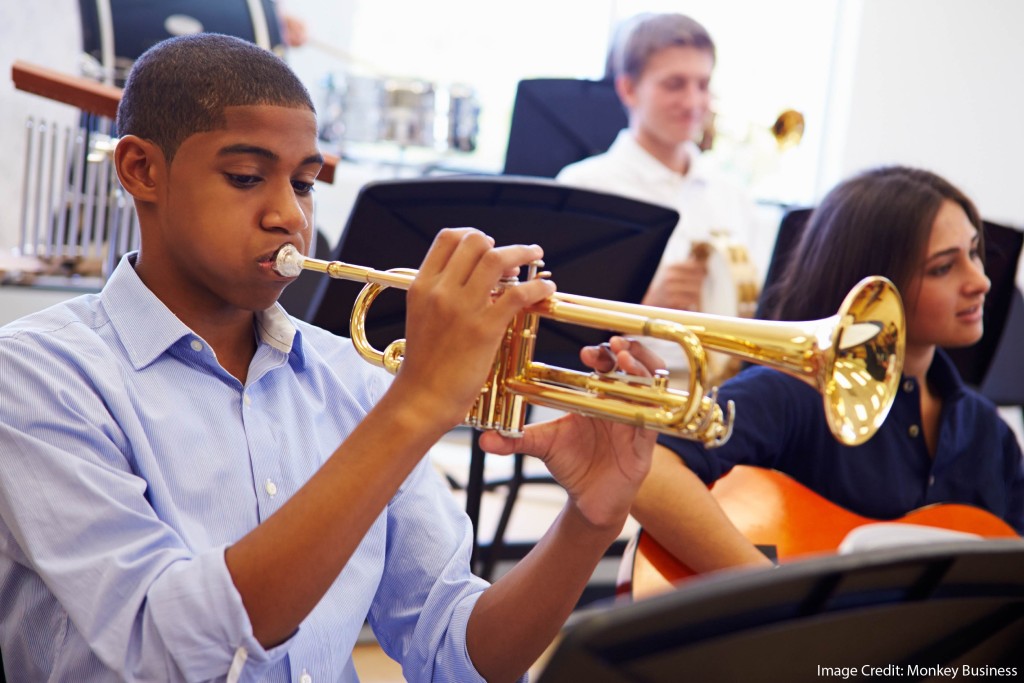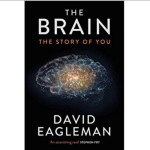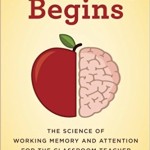Should 9th graders start music classes–even if they’ve never played an instrument before? Are there academic benefits to studying music? Is 9th grade too late a start to get those benefits? Should my school’s STEM program become a STEAM program?
A recent study by Adam T. Tierney offers some answers to these compelling questions.
The Short Version
Tierney & Co. followed 19 high school students who enrolled in a high school music ensemble, and compared them to 21 students at the same school who started a JROTC program.
These groups started off nicely matched in various academic and linguistic measures. However, at the end of 4 years, the group that had studied music improved in some suggestive ways.
First, the neural signatures of their response to speech changed meaningfully; oversimplifying a bit here, they were “more mature.”
Second, the musicians improved more than the JROTC participants in their ability to distinguish between and manipulate language sounds.
Reasons to be Excited
Tierney’s study gives us several reasons to perk right up.
For example: we’ve known for a long time that life-long musicians have these language processing benefits. Now we have good reason to think that even those who pick up an instrument later in life get them as well.
Another example: this study compares the musicians to the JROTC participants. That is, it does not compare them just to some random collection of non-musicians. Like these new musicians, the JROTC students had a highly disciplined practice schedule, had to function in a structured group, and so forth.
Because the study includes this “active control group,” we can be sure the results don’t come from–say–just being part of an organized school activity.
Most exciting: the students’ improvement in their ability to process language sounds.
This ability–called “phonemic awareness”–gets a lot of research attention, because it can predict success in several essential language skills: reading and writing, to name two.
We test phonemic awareness in many ways. For instance:
- “Which one of these words does not rhyme with the others: bell, swell, full, tell.”
- “Say the word ‘boat.’ Now, say that again without the ‘b’ sound.”
- “How many syllables are there in the word ‘ventricle’?”
If music practice–even music practice begun in high school–can improve students’ phonemic awareness, it just might be able to help them do well in other courses where they have to process language–which is to say: all of them.
Reasons to Remain Calm
Tierney’s study is exciting, but we shouldn’t require all of our students to join band just yet. Here are a few important gaps in this research:
The students enrolled in music class improved their phonemic awareness, but Tierney didn’t measure if that improvement had any impact on, say, their performance in English class; or, perhaps, their ability to learn a new language. That effect is plausible, but not demonstrated here.
Also, Tierney & Co. measured two other linguistic abilities beyond phonemic awareness: phonological memory, and rapid naming. They found no statistically significant difference between the music students and the JROTC students in these two measures.
If one measure out of three shows improvement, that’s good. But it’s not a home run.
And, a point about the research methodology here. These students chose to join band or JROTC; they were not–in the “gold standard” of research–randomly assigned to do so. (Of course: there are many good reasons to let students choose, rather than forcing them into one group or another.)
The differences we see, therefore, might not have to do with the experience of band vs. JROTC. Instead, they might be differences in the kind of 9th grader who wants to be in band vs. the kind of 9th grader who wants to be in JROTC.
In other words: perhaps those band students were always a little better at discriminating among sounds, which is why they were drawn to music in the first place. Tierney’s team did try to rule that out with their various pre-study measures, but perhaps those differences are not captured by the tests we have.
We just don’t know. (Or, better said: we don’t “know” in the way that scientists want to know things.)
A Final Point
I understand why people are attracted to this argument: “students should do art because it makes them better at other things we do in school.”
I am more attracted to this argument: “students should make art because it’s an essential expression of human joy, sorrow, love, solitude, fun, reverence, and hope.”
In other words: I don’t think schools should foster art because it makes people better at STEM. I think schools should champion art because it makes people better at being people.





HIGH SCHOOL MUSIC CLASSES is a very helpful site for me. I mostly interest music.Many many thanks for this site.